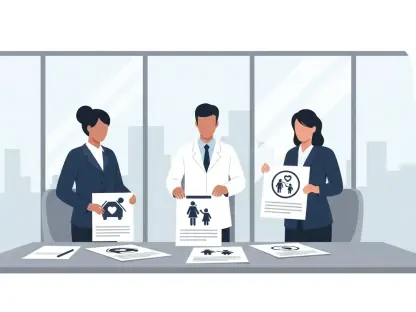In the bustling streets of Brooklyn, New York, car accidents are an unfortunate reality for many residents, often leaving victims grappling with not just physical injuries but also the complex aftermath of dealing with insurance companies. The process can feel like navigating a labyrinth, especially when insurance adjusters, who appear to offer support, employ subtle tactics to minimize payouts. Samantha Kucher, a seasoned car accident attorney with extensive experience in the field, has stepped forward to highlight the hidden dangers and common traps that accident victims face during these interactions. Her insights serve as a vital resource for those caught in the web of New York’s no-fault insurance system, compounded by Brooklyn’s unique legal and traffic challenges. This guidance aims to empower victims to protect their rights and secure the compensation they deserve, shedding light on an often opaque and intimidating process.
Unmasking the True Intentions of Adjusters
Dealing with insurance adjusters after a car accident might seem straightforward, but beneath their sympathetic tone often lies a calculated agenda. These professionals are employed by insurance companies with the primary objective of reducing financial liability, not ensuring that victims receive fair compensation. A seemingly innocuous comment, such as mentioning feeling “okay” right after a crash, can be interpreted as evidence of negligible injury, leading to drastically reduced settlement offers. This conflict of interest transforms every interaction into a potential minefield where casual conversations are strategically used to undermine claims. Victims must remain vigilant, understanding that adjusters are trained to identify any opportunity to lower payouts, even when they project an image of concern or assistance.
The implications of this dynamic are significant for anyone navigating a claim in Brooklyn’s complex environment. Beyond the immediate shock of an accident, victims face the added pressure of protecting their statements from misinterpretation. Adjusters may engage in friendly small talk to elicit responses that can later be used to question the severity of injuries or the circumstances of the incident. Recognizing this tactic is crucial, as it highlights the importance of approaching every conversation with caution. Without this awareness, individuals risk diminishing their legitimate claims through words that seem harmless in the moment but carry heavy consequences in the long run. Staying guarded during these exchanges can make a substantial difference in the outcome of a case.
Risks of Recorded Statements and Excessive Disclosure
One of the most perilous missteps accident victims can make is agreeing to provide recorded statements to insurance adjusters without proper preparation. These recordings are often framed as routine, yet they serve as tools for adjusters to extract information that might weaken a claim. Questions may be crafted to downplay the extent of injuries or subtly shift blame, and once captured on record, such statements become permanent evidence that can challenge a victim’s credibility. Limiting communication to essential details—such as the time, date, and location of the accident—helps avoid the trap of saying something that could be misconstrued or used against the claimant in negotiations or legal proceedings.
Equally damaging is the tendency to overshare personal information during these discussions. Revealing details about financial hardships, prior medical conditions, or unrelated life events can provide adjusters with ammunition to question the validity or severity of current damages. For instance, mentioning past injuries might lead to arguments that current pain is unrelated to the recent accident, thereby justifying lower compensation. The advice here is to maintain strict boundaries in conversations, ensuring that only pertinent facts are discussed. By keeping interactions concise and focused, victims can safeguard their claims from being undermined by irrelevant or exploitable disclosures, preserving the integrity of their case.
Perils of Hasty Settlements and Fault Admissions
Insurance companies often capitalize on the vulnerability of accident victims by pushing for quick settlements that rarely reflect the true cost of damages. These initial offers are typically presented as convenient solutions but frequently fail to account for ongoing medical treatments, lost income, or emotional distress. Accepting such a settlement can lock victims into an agreement that falls short of covering future needs, especially when injuries require long-term care. Resisting the urge to settle prematurely is vital, as it allows time to fully assess the impact of the accident and build a stronger case for adequate compensation tailored to actual losses.
Another critical error lies in inadvertently admitting fault through casual remarks or apologies during conversations with adjusters. Under Brooklyn’s comparative negligence laws, even partial responsibility can reduce the compensation awarded, making every word spoken a potential liability. A simple expression of regret or an offhand comment about the incident can be spun as an admission of guilt, disproportionately affecting the final payout. Exercising caution in these exchanges is non-negotiable, as even well-intentioned statements can alter the trajectory of a claim. Victims must prioritize measured responses to prevent such misinterpretations from derailing their pursuit of fair restitution.
Importance of Timing in Injury Claims
Discussing injuries with an insurance adjuster before obtaining a comprehensive medical evaluation can severely jeopardize a claim’s validity. Many injuries, such as concussions or internal damage, may not present immediate symptoms, remaining hidden in the chaotic aftermath of a collision. Prematurely claiming to be unharmed or downplaying discomfort can later be used to argue that subsequent medical issues are unrelated to the accident. Waiting for a thorough diagnosis ensures that all conditions are documented, providing a solid foundation for claims under New York’s no-fault insurance structure, where evidence is paramount to securing rightful benefits.
This delay in discussion also protects against underestimating the long-term effects of an injury, which might only become apparent weeks or months later. Adjusters may seize on early statements of minimal harm to cap compensation, ignoring future complications or rehabilitation needs. Proper medical records serve as indisputable proof of the accident’s impact, countering attempts to diminish the claim’s worth. By prioritizing a complete health assessment before engaging in detailed injury conversations, victims can avoid pitfalls that might otherwise limit their ability to recover full damages. This strategic patience is a cornerstone of building a robust case in Brooklyn’s intricate legal landscape.
Essential Need for Legal Advocacy
Facing insurance adjusters without legal support can place accident victims at a significant disadvantage, as the process is fraught with complexities that require specialized knowledge. An attorney serves as a critical shield, handling communications to prevent accidental missteps and countering manipulative tactics aimed at pressuring individuals into unfavorable deals. This professional intervention is particularly crucial in Brooklyn, where local traffic dynamics, law enforcement protocols, and insurance regulations add layers of difficulty to claims. Legal representation ensures that every aspect of the case is managed with precision, safeguarding the victim’s interests against corporate strategies.
Moreover, legal advocates bring an understanding of how to navigate New York’s no-fault system while addressing the unique challenges of the area. They can accurately assess the value of a claim, factoring in not just immediate costs but also future expenses and intangible losses like pain and suffering. Without this expertise, victims risk being overwhelmed by the adjuster’s persistence or misled by offers that seem generous but fall short of true compensation. Engaging an attorney levels the playing field, providing the confidence that rights are protected and claims are pursued with the full weight of legal backing. This support transforms a daunting ordeal into a structured path toward justice.
Safeguarding Rights Through Informed Action
Reflecting on the challenges faced by car accident victims in Brooklyn, it becomes evident that interactions with insurance adjusters demand a high degree of caution and strategy. Samantha Kucher’s expert warnings illuminate the deceptive practices that could ensnare the unprepared, from recorded statements to premature settlements. Moving forward, accident victims are encouraged to take proactive steps by limiting direct communication with adjusters and seeking immediate legal counsel to navigate these treacherous waters. Documenting every detail through medical evaluations and maintaining strict boundaries in discussions prove to be essential measures. As a next step, individuals should consider consulting with a qualified attorney to evaluate their specific circumstances, ensuring that no tactic or oversight diminishes their rightful compensation. This informed approach promises to empower victims, turning a potentially exploitative process into an opportunity for fair resolution.









